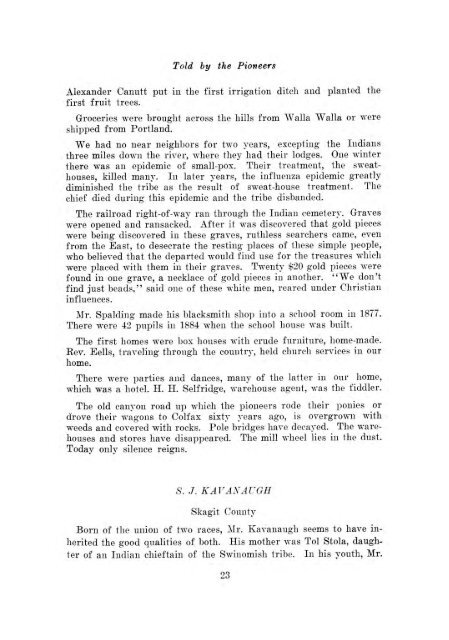TOLD by the PIONEERS - Washington Secretary of State
TOLD by the PIONEERS - Washington Secretary of State
TOLD by the PIONEERS - Washington Secretary of State
You also want an ePaper? Increase the reach of your titles
YUMPU automatically turns print PDFs into web optimized ePapers that Google loves.
Told<br />
<strong>by</strong> <strong>the</strong> Pioneers<br />
Alexander Canutt put in <strong>the</strong> first irrigation ditch and<br />
first fruit trees.<br />
planted <strong>the</strong><br />
Groceries were brought across <strong>the</strong> hills from "'Valla Walla or were<br />
shipped from Portland.<br />
We had no near neighbors for two years, excepting <strong>the</strong> Indians<br />
three miles down <strong>the</strong> river, where <strong>the</strong>y had <strong>the</strong>ir lodges. One winter<br />
<strong>the</strong>re was an epidemic <strong>of</strong> small-pox. Their treatment, <strong>the</strong> 8weathouses,<br />
killed many. In later years, <strong>the</strong> influenza epidemic greatly<br />
diminished <strong>the</strong> tribe as <strong>the</strong> result <strong>of</strong> sweat-hoUf;e treatment. The<br />
chief died during' this epidemic and <strong>the</strong> tribe disbanded.<br />
The railroad right-<strong>of</strong>-way ran through <strong>the</strong> Indian cemetery. Graves<br />
were opened and ransacked. After it \vas discovered that gold pieces<br />
were being discovered in <strong>the</strong>se graves, ruthless searchers came, even<br />
from <strong>the</strong> East, to desecrate <strong>the</strong> resting places <strong>of</strong> <strong>the</strong>se simple people,<br />
who believed that <strong>the</strong> departed would find use for <strong>the</strong> treasures which<br />
were placed with <strong>the</strong>m in <strong>the</strong>ir graves. Twenty $20 gold pieces were<br />
found in one gTave, a necklace <strong>of</strong> gold pieces in ano<strong>the</strong>r. "We don't<br />
find just beads," said one <strong>of</strong> <strong>the</strong>se white men, reared under Christian<br />
influences.<br />
Mr. Spalding made his blacksmith shop into a school room in 1877.<br />
There were 42 pupils in 1884 when <strong>the</strong> school house was built.<br />
The first homes were box houses with crude furniture, home-made.<br />
Rev. Eells, tra,-eling through <strong>the</strong> country, held church services in our<br />
home.<br />
There were parties and dances, many <strong>of</strong> <strong>the</strong> latter in our home,<br />
which was a hotel. H. H. Selfridge, warehouse agent, was <strong>the</strong> fiddler.<br />
The old canyon road up which <strong>the</strong> pioneers rode <strong>the</strong>ir ponies or<br />
drove <strong>the</strong>ir wagons to Colfax sixty years ago, is overgTown with<br />
weeds and covered with rocks. Pole bridges have decayed. The warehouses<br />
and stores have disappeared. The mill wheel lies in <strong>the</strong> dust.<br />
Today only silence reigns.<br />
S. J. KAVANAL'GH<br />
Skagit County<br />
Born <strong>of</strong> <strong>the</strong> union <strong>of</strong> two races, 1\11'. Kavanaugh seems to have inherited<br />
<strong>the</strong> good qualities <strong>of</strong> both. His mo<strong>the</strong>r was Tal StoIa, daughter<br />
<strong>of</strong> an Indian chieftain <strong>of</strong> <strong>the</strong> Swinomish tribe. In his youth, Mr.<br />
23

















